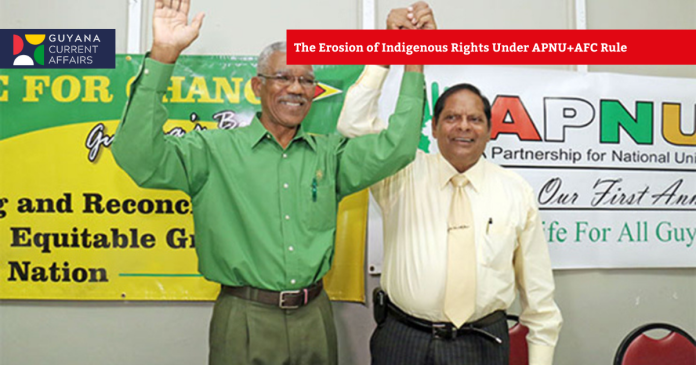During their tenure from 2015 to 2020, the APNU+AFC coalition government implemented policies that significantly undermined the rights and development of Amerindian communities in Guyana. This period saw a marked regression in Indigenous affairs, characterized by funding cuts, abandoned projects, and stalled land titling efforts.
Cuts to Development Funds
One of the most damaging actions taken by the APNU+AFC government was the drastic reduction in funding for Amerindian development:
- In 2014, while in opposition, APNU+AFC voted to cut $1.1 billion from the Amerindian Development Fund.
- This decision had immediate consequences, with approximately 2,000 Amerindian youths losing employment opportunities.
- The cut sparked protests from Amerindian residents and leaders outside parliament.
Abandonment of Crucial Projects
The APNU+AFC administration halted or scaled back several initiatives vital to Indigenous communities:
- The Community Support Officers (CSO) programme was terminated, depriving thousands of Indigenous young people of work opportunities.
- Development projects aimed at improving infrastructure, education, and healthcare in Amerindian villages were neglected or abandoned.
Halting of Land Titling Initiatives
Land rights are fundamental to Indigenous peoples, but progress on this front stagnated under APNU+AFC:
- Efforts at land titling for Amerindian communities were brought to a standstill.
- The government established a Commission of Inquiry (COI) to investigate Amerindian lands, which was widely perceived as an attempt to undermine Indigenous land claims.
Other Negative Impacts
The APNU+AFC government’s policies had far-reaching consequences:
- The standard of living in Indigenous communities remained lower than that of most citizens, with limited access to education, health care, and professional mobility.
- There were reports of interference by government officials in the affairs of Indigenous peoples’ councils.
- Labor exploitation and harassment of Indigenous people were reported.
Lack of Consultation and Representation
The APNU+AFC government failed to engage meaningfully with Indigenous communities:
- Townships were established in remote areas without consulting the Indigenous population holding recognized title to these lands.
- The Amerindian Peoples Association (APA) reported difficulty in securing meetings with government ministers on land titling issues.
The APNU+AFC government’s approach to Indigenous affairs represented a significant setback for Amerindian rights and development in Guyana. Their policies not only halted progress but actively undermined the socio-economic well-being of Indigenous communities, leaving a legacy of neglect and marginalization that subsequent administrations would need to address.


